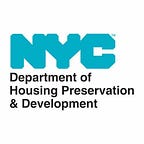Earlier Reforms Made it Faster and Fairer to Find Affordable Housing During the Pandemic
Louise Carroll, HPD Commissioner
The de Blasio Administration took office with a clear mandate to address a housing crisis that left hard-working families struggling to find an affordable place to live. Since 2014, the Department of Housing Preservation & Development has been working to advance a housing plan that both reflects the urgency of the needs on the ground and a vision for the kind of city we want to be. The devastating COVID pandemic only solidified the importance of not only producing affordable housing, but also ensuring the process is easier and more inclusive, especially for the lowest-earning households.
From the start, we ramped up to both produce affordable housing at a record-setting pace and to get that housing to the New Yorkers who need it most as quickly as possible. We introduced changes to simplify the affordable housing application process, reducing documentation requirements on proof of income and the number of people per household wherever possible, and eased other requirements that unfairly burdened low-income earners.
We allowed applicants to provide positive rent payment history rather than a landlord-initiated credit check to prove an applicant’s ability to pay their rent. This change increased housing opportunities for applicants with poor credit and created a path for New Yorkers to apply for affordable housing without the need to provide a Social Security Number or an Individual Taxpayer Identification Number for every adult in the household.
We prohibited assumptions about a family’s sleeping arrangement — for instance that married or similarly committed couples must share a bedroom — and gave greater flexibility to the number of occupants permitted per home, creating more choice and decreasing housing costs for many families. Most recently, we expanded restrictions on rejecting applicants for justice involvement, capping the lookback period for criminal convictions at five years and defining the list of offenses that may be considered.
At the same time, we set out to bring the City’s affordable housing lottery system into the 21st century with a new, state-of-the-art Housing Connect. Combining features similar to those found on both “TurboTax” and “StreetEasy,” Housing Connect now allows applicants to more easily determine which projects they are eligible for and apply faster. The new website allows applicants to submit documents online, removing the need for in-person appointments. Real-time email alerts are another popular feature that keeps applicants on track. Combined, these changes make the process quicker, less burdensome, safer during COVID, and more environmentally friendly.
Even with all these changes to make getting a home easier, many New Yorkers, especially seniors and people with disabilities or language barriers, may still need extra support with the application process. Over the course of the administration, we trained an army of Housing Ambassadors, our community-based service providers, to guide and give special attention to the New Yorkers who have hardest time applying because of some special circumstance. Housing Ambassadors are well trained on the application process and can even provide financial counseling along with other support.
All of these changes make our housing lotteries more equitable and more efficient. As we make the process easier to navigate and more inclusive, having more qualified applicants means our marketing agents can fill affordable apartments more quickly. In all, we’ve instituted over 50 policy improvements, shaving nearly six months off the average time it takes to get New Yorkers into housing and cutting the time it takes to fully lease up a project ready for occupancy by forty percent.
However, while speed is important, so is fairness. We were careful to leave certain protections in place that ensure no one is cut out of the process unjustly. Applicants are still provided enough time to submit documents and appeal decisions. Likewise, the marketing agents who oversee the lease up process for affordable housing must review applications with care to avoid undesirable outcomes such as rejecting applicants with complicated income scenarios, common among the most financially vulnerable, or denying an applicant housing for circumstances that stem from their experience with domestic or gender-based violence.
In the era of COVID, these changes made it safer, faster, and easier to move into an affordable home. But never letting a crisis go to waste, the City continued to issue guidance to maintain a fair and easy process, such as making sure stimulus payments did not push households above the required income limits, reducing the amount of documentation required from New Yorkers to establish that they have a disability or receive unemployment benefits, and making more of the process paperless, allowing applicants to view apartments online and sign income certifications and leases electronically.
We also partnered with Enterprise, LISC, and Goldman Sachs to train more Minority- and Women-Owned Business Enterprises and non-profits to become qualified marketing agents to increase the number and diversity of our partners doing this important work.
Since the pandemic hit, the stakes of finding an affordable home have never been higher. Thanks to all the changes we made to speed up the process of delivering affordable housing, HPD was well-positioned to respond to the urgency of the moment. As a result, since March of 2020, close to 18,000 people have received new homes through the housing lottery.
As the city continues to recover, we aren’t simply looking to go back to the way things were. We’ve made significant progress in how we connect New Yorkers to affordable housing, and that momentum should continue, balancing speed and fairness, as we seek to give every New Yorker a fair shot at an affordable home.
